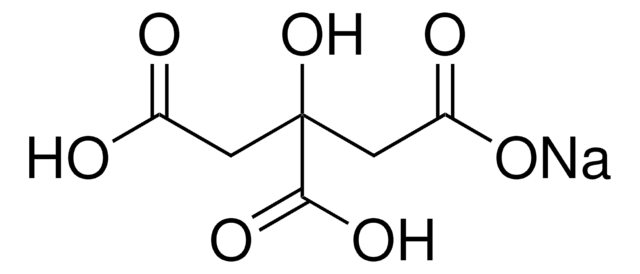71635
Sodium citrate dibasic sesquihydrate
purum p.a., ≥99.0% (T)
Synonym(s):
Citric acid disodium salt, Disodium hydrogen citrate sesquihydrate
About This Item
Recommended Products
grade
purum p.a.
Quality Level
Assay
≥99.0% (T)
form
crystals
pH
4.6-5.2 (25 °C, 50 mg/mL in H2O)
solubility
water: soluble 263.1 g/L
anion traces
chloride (Cl-): ≤50 mg/kg
sulfate (SO42-): ≤50 mg/kg
cation traces
Ca: ≤50 mg/kg
Cd: ≤50 mg/kg
Co: ≤50 mg/kg
Cu: ≤50 mg/kg
Fe: ≤50 mg/kg
K: ≤100 mg/kg
Ni: ≤50 mg/kg
Pb: ≤50 mg/kg
Zn: ≤50 mg/kg
functional group
carboxylic acid
SMILES string
O.O.O.[Na+].[Na+].[Na+].[Na+].OC(=O)CC(O)(CC([O-])=O)C([O-])=O.OC(=O)CC(O)(CC([O-])=O)C([O-])=O
InChI
1S/C6H8O7.2Na.H2O/c7-3(8)1-6(13,5(11)12)2-4(9)10;;;/h13H,1-2H2,(H,7,8)(H,9,10)(H,11,12);;;1H2/q;2*+1;/p-2
InChI key
XNZQCYSOYHAYII-UHFFFAOYSA-L
Looking for similar products? Visit Product Comparison Guide
Related Categories
General description
Application
- In the Supel Que Citrate (EN) tubes for the quantification of pesticides in blackcurrants by triple quadrupole GC-QqQ-MS/MS [Gas chromatography coupled to tandem mass spectrometry (GC-MS/MS) coupled with triple quadrupole (QqQ) analyzer] method.
- Dispersive solid phase extraction (dSPE) method, commonly referred as QuEChERS.2
- Preparation of RNA precipitation solution.
Storage Class Code
13 - Non Combustible Solids
WGK
WGK 1
Flash Point(F)
Not applicable
Flash Point(C)
Not applicable
Personal Protective Equipment
Choose from one of the most recent versions:
Already Own This Product?
Find documentation for the products that you have recently purchased in the Document Library.
Customers Also Viewed
Protocols
AOAC method 2012.13 was applied to the analysis of powdered infant formula for the identification and quantitation of all labeled fatty acids and fatty acid groups.
Our team of scientists has experience in all areas of research including Life Science, Material Science, Chemical Synthesis, Chromatography, Analytical and many others.
Contact Technical Service





